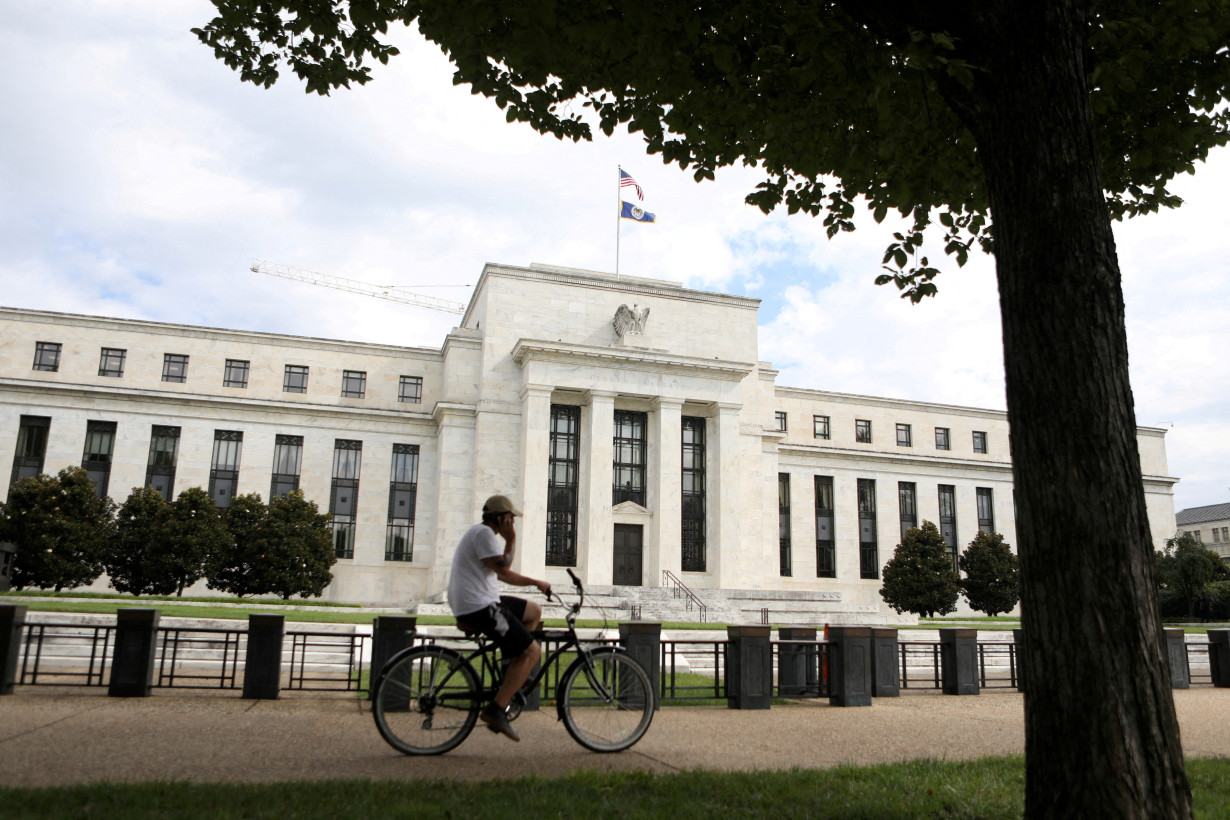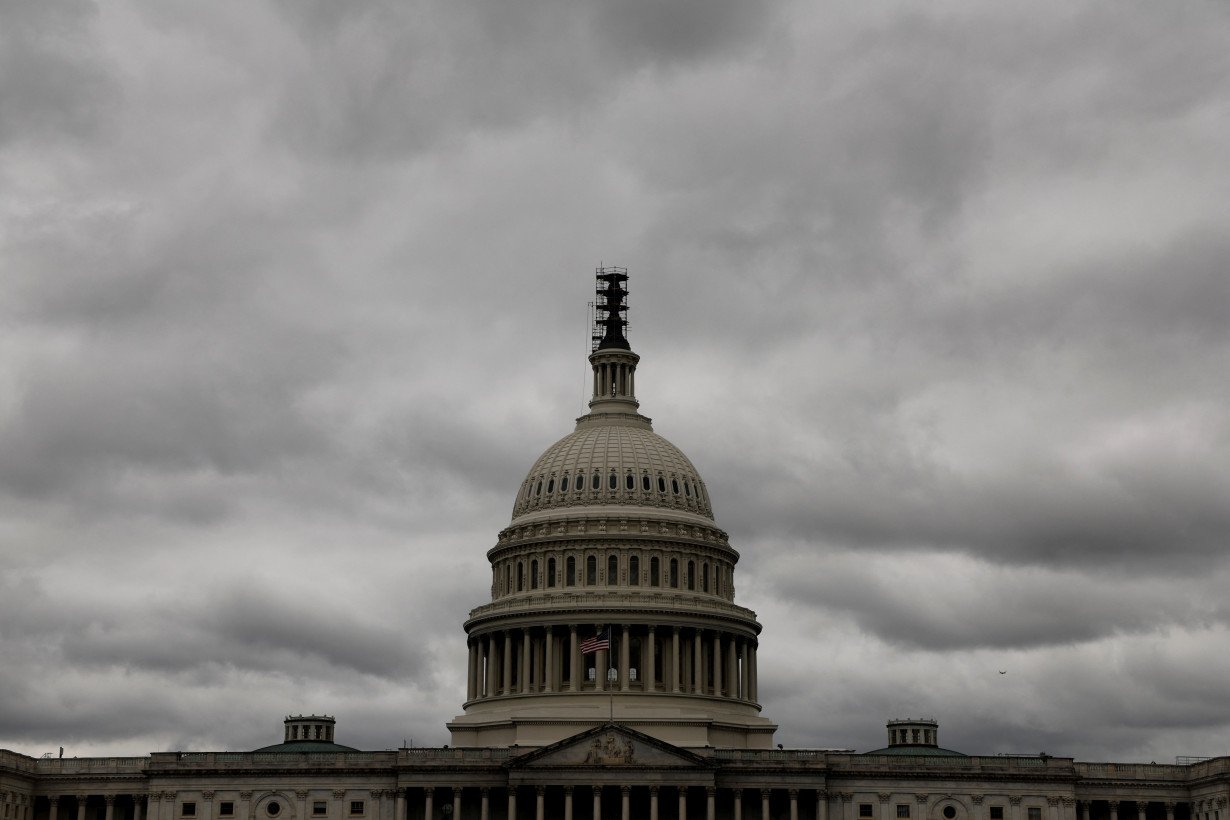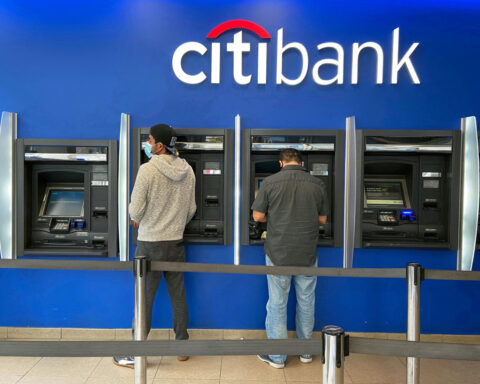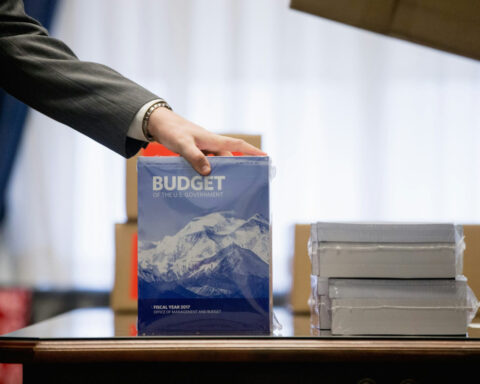(Reuters) - U.S. government services would be disrupted and hundreds of thousands of federal workers would be furloughed without pay if Congress fails to provide funding for the fiscal year starting Oct. 1. Workers deemed essential would remain on the job, but without pay.
Here is a guide to what would stay open and what would shut down, according to agency shutdown plans:
MILITARY
The 2 million U.S. military personnel would remain at their posts, but roughly half of the Pentagon's 800,000 civilian employees would be furloughed.

Contracts awarded before the shutdown would continue, and the Pentagon could place new orders for supplies or services needed to protect national security. Other new contracts, including renewals or extensions, would not be awarded. Payments to defense contractors such as Boeing, Lockheed Martin and RTX, formerly known as Raytheon, could be delayed.
The Department of Energy's National Nuclear Security Administration would continue maintaining nuclear weapons.
LAW ENFORCEMENT

Agents at the FBI, the Drug Enforcement Administration (DEA) and other federal law enforcement agencies would remain on the job, and prison staffers would continue to work.
The Secret Service and the Coast Guard would also continue operations, and most employees would continue to work.
Most of the Federal Trade Commission's consumer-protection workers would be furloughed, as would half of its antitrust employees.

SOCIAL SECURITY, MEDICARE AND OTHER BENEFITS
The Social Security Administration would continue to issue retirement and disability benefits, though the agency might have to delay its announcement of its annual increase in payments.
BORDERS AND HOMELAND SECURITY
Most Border Patrol and immigration enforcement agents would continue to work, as would most customs officers.
Local governments would not get new aid to shelter migrants.
The Cybersecurity and Infrastructure Security Agency would suspend security reviews that help schools, local governments and other institutions defend against ransomware.
FEDERAL COURTS
Federal courts have enough money to stay open until at least Oct. 13. Activities might be scaled back after that point. The Supreme Court would stay open as well.
Criminal prosecutions, including the two federal cases against former President Donald Trump, would continue. Most civil litigation would be postponed. The government's landmark Google antitrust lawsuit would continue.
CONGRESS
Lawmakers continue to collect paychecks, even as other federal workers do not. Staffers do not get paid, though those deemed essential would be required to work.
TRANSPORTATION
Airport security screeners and air-traffic control workers would be required to work, according to recent contingency plans, though absenteeism could be a problem. Some airports had to suspend operations during a shutdown in 2019 when traffic controllers called in sick.
Training for 1,000 new air-traffic controllers would stop, leaving the system understaffed. The Transportation Security Administration would not be able to hire new airport security screeners ahead of the busy holiday travel season.
Some major infrastructure projects could face delays as environmental reviews and permitting would be disrupted, according to the White House.
FOREIGN AFFAIRS
U.S. embassies and consulates would remain open. Passport and visa processing would continue as long as there were sufficient fees to cover operations. Nonessential official travel, speeches and other events would be curtailed.
Some foreign aid programs could run out of money as well.
NATIONAL PARKS AND NATURAL RESOURCES
It's not clear how national parks, national monuments and other sites would be affected. Many remained open during a 2018-2019 shutdown, through restrooms and information desks were closed and waste disposal was halted. They were closed during a 2013 shutdown.
Wildfire fighting efforts would continue, according to the Agriculture Department's 2020 contingency plan, though timber sales on national forest lands would be curtailed and fewer recreation permits would be issued.
MUSEUMS
The Smithsonian museums that line the National Mall would close, as would the National Zoo. That would bring a premature end to the Zoo's farewell celebration for its three giant pandas, which are due to return to China.
SCIENCE
Scientific research would be disrupted as agencies like the National Institutes of Health, the National Science Foundation and the National Oceanographic and Atmospheric Administration (NOAA) would furlough most of their workers, according to recent contingency plans.
The National Aeronautics and Space Administration (NASA) would continue to support the International Space Station and track satellites, but 17,000 of its 18,300 employees would be furloughed.
Weather forecasts and fisheries regulation would continue, as would patent and trademark reviews. Tests of new drugs and medical devices would continue.
The Federal Communications Commission (FCC) would suspend consumer-protection activities, equipment reviews, and licensing of TV and radio stations. It would continue to distribute telecommunications subsidies and its broadband mapping effort.
HEALTH
The Centers for Disease Control and Prevention (CDC) would continue to monitor disease outbreaks, though other public health activities could suffer as more than half of the agency's workers would be furloughed.
The National Institutes of Health would furlough most of its staff and delay new clinical trials for medical treatments.
Healthcare services for military veterans and Native Americans would continue.
Most inspections of hazardous waste sites and drinking water and chemical facilities would stop.
Food-safety inspections by the Food and Drug Administration (FDA) could be delayed.
FINANCIAL REGULATION
The Securities and Exchange Commission (SEC) would furlough roughly 90% of its 4,600 employees and suspend most activities, leaving only a skeleton staff to respond to emergencies.
Likewise, the Commodities and Futures Trading Commission (CFTC) would furlough almost all of its employees and cease oversight, enforcement and regulation, according to its 2021 plan.
The Federal Reserve, the Federal Deposit Insurance Corporation (FDIC) and the Office of the Comptroller of the Currency would continue as normal, as they are funded by industry fees rather than congressional appropriations.
The Financial Industry Regulatory Authority (FINRA), an industry-financed brokerage oversight body, would continue to operate.
ECONOMIC DATA
The publication of major U.S. economic data, including employment and inflation reports of critical importance to policymakers and investors, would be suspended, according to the Biden administration.
SOCIAL SECURITY, MEDICARE AND OTHER BENEFITS
The Social Security Administration would continue to issue retirement and disability benefits, and payments would continue under the Medicare and Medicaid healthcare programs.
Military veterans' benefits would also continue, according to a 2021 contingency plan.
Nutrition benefits provided to 7 million mothers through the Women, Infants and Children program would be cut within days, according to Agriculture Secretary Tom Vilsack.
Food aid through the Supplemental Nutrition Assistance Program (SNAP) would go out as normal for October, but could be affected after that, he said.
TAX COLLECTION
The Internal Revenue Service (IRS) has not released a current contingency plan. The Committee for a Responsible Federal Budget, a watchdog group, says the agency would operate as normal and all 83,000 employees would continue to be paid because its funding would not expire.
DISASTER RESPONSE
The Federal Emergency Management Agency (FEMA) would be at risk of running out of disaster-relief funds. The agency is already delaying payments to some long-term recovery projects in order to keep money on hand for more immediate relief during hurricane and wildfire season.
EDUCATION
Pell Grants and student loans would continue to be paid, but could be disrupted as most Education Department employees would be furloughed, according to the agency's 2021 plan.
A protracted shutdown could "severely curtail" aid to schools, universities and other educational institutions, the department says. It also could delay funds that are due to be awarded later in the year.
WATERWAYS
The U.S. Army Corps of Engineers would continue to operate locks, dams and flood control facilities. Most employees would not be furloughed.
CHILD CARE
According to the White House, 10,000 children from low-income families would lose access to the Head Start preschool program.
SMALL BUSINESS SUPPORT
The Small Business Administration would not be able to issue any new loans, though loans for businesses hurt by natural disasters would continue.
AGRICULTURE
Meat and egg inspections would continue, but some lab services would be disrupted, making it harder to fight animal diseases. Crop insurance would not be affected, but some loan programs would be. Research, conservation and rural development programs would be shut down.
LABOR
Workplace safety inspections would be limited, and investigations into unfair pay practices would be suspended, according to the White House.
The ability of the National Labor Relations Board (NLRB) to mediate labor disputes would be curtailed because almost all of its 1,200 employees would be furloughed, according to a 2022 plan.
HOUSING
Monthly subsidies for public housing and low-income housing aid would be at risk. The Federal Housing Administration would continue to back insured mortgages, and Ginnie Mae would continue to back the secondary mortgage market. New homebuyers in rural areas would not be able to get loans from the Agriculture Department.
WHITE HOUSE
In the 2018-2019 shutdown, the White House furloughed 1,100 of 1,800 staff in the Executive Office of the President. Some offices, such as the National Security Council, continued at full strength, while others like the Office of Management and Budget (OMB) were scaled back sharply.
White House furloughs could make it harder for Republicans in the House of Representatives to get information for their impeachment investigation of Democratic President Joe Biden.
The U.S. Constitution specifies that the president continues to get paid.
MAIL DELIVERY
The U.S. Postal Service would be unaffected, as it does not depend on Congress for funding.
(Reporting by Andy Sullivan, Pete Schroeder, Howard Schneider, Moira Warburton, Nate Raymond, Makini Brice, Steve Holland, Julia Harte, Diane Bartz, Andrew Chung and Lucia Mutikani; Editing by Scott Malone, Jonathan Oatis and Aurora Ellis)

 Insurance for natural disasters is failing homeowners − I don’t have the answers, but I do know the right questions to ask
Insurance for natural disasters is failing homeowners − I don’t have the answers, but I do know the right questions to ask
 Joe Biden’s record on science and tech: Investments and regulation for vaccines, broadband, microchips and AI
Joe Biden’s record on science and tech: Investments and regulation for vaccines, broadband, microchips and AI
 Meta shift from fact-checking to crowdsourcing spotlights competing approaches in fight against misinformation and hate speech
Meta shift from fact-checking to crowdsourcing spotlights competing approaches in fight against misinformation and hate speech
 Hope and dread as Israelis and Palestinians await a Gaza truce that may not end their suffering
Hope and dread as Israelis and Palestinians await a Gaza truce that may not end their suffering
 In eyeing Greenland, Trump is echoing long-held American designs on the Arctic expanse
In eyeing Greenland, Trump is echoing long-held American designs on the Arctic expanse
 When Sylvester Stallone’s French dubbing artist died, AI recreated his voice. His daughter is not happy
When Sylvester Stallone’s French dubbing artist died, AI recreated his voice. His daughter is not happy
 'It's not good enough.' Sidney Crosby, Evgeni Malkin and the Penguins are floundering at midseason
'It's not good enough.' Sidney Crosby, Evgeni Malkin and the Penguins are floundering at midseason
 Jayden Daniels accomplishes a feat last done by Slinging Sammy Baugh in 1937
Jayden Daniels accomplishes a feat last done by Slinging Sammy Baugh in 1937
 Wildfires latest: A final round of dangerous fire weather and dry conditions is in the forecast
Wildfires latest: A final round of dangerous fire weather and dry conditions is in the forecast








